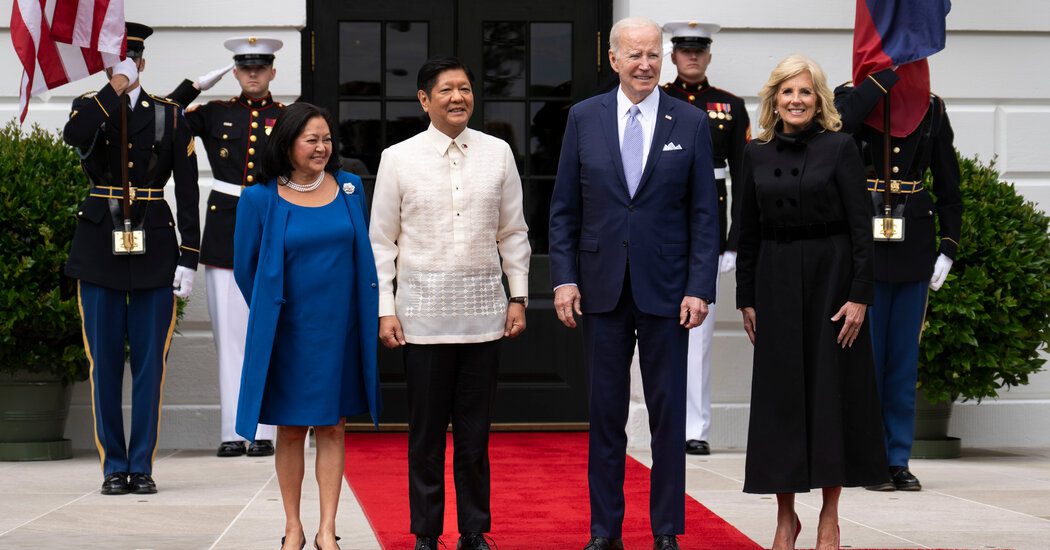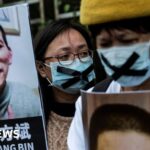Global Courant 2023-05-02 19:39:27
Before becoming president of the Philippines, Ferdinand Marcos Jr. that “if you let the US in, you make China your enemy.”
But as he sat in the White House on Monday, President Biden congratulated him as a top ally and said Washington couldn’t have a better partner.
Mr. Marcos, less than a year in office, has emerged as one of the Philippines’ most transformative foreign policy presidents, turning from a diplomatic tightrope into a powerful lynchpin to Washington in its rising rivalry with China.
Shortly after his inauguration in June, Mr. Marcos welcomed a series of visits from several top US officials. Defense officials began briefing Mr. Marcos on Russia’s invasion of Ukraine and the parallels of a possible similar attack by China on Taiwan, which lies across a narrow waterway from the Philippines. Then, in January, Mr. Marcos announced that the United States would gain access to four more military sites in the Philippines. Last month, the Philippines staged the largest-ever joint military exercise between the two countries.
“What’s surprising to me is the pace and acceleration,” said Aries Arugay, a visiting fellow at the ISEAS-Yusof Ishak Institute in Singapore. “I didn’t expect to say this last year, but I think on foreign policy, he’s sending the right signals.”
Mr. Marcos, known by his nickname Bongbong, enjoys the support of the voters. Surveys have shown that most Filipinos see China as a pressing threat and want the Marcos administration to work more closely with the United States to resist Beijing’s territorial pressures and improve security forces. Mr Marcos’ approval rating stands at 78 percent, according to a March survey conducted by Pulse Asia, a polling firm.
Analysts say another factor driving Mr. Marcos’ scope is his personal desire to rehabilitate his family name, one that for decades has been seen as synonymous with excess and greed.
The Marcoses are accused of looting as much as $10 billion from the government before fleeing to Hawaii in 1986, when peaceful “People Power” protests overthrew Mr. Marcos’s father, the dictator Ferdinand E. Marcos . The family returned to the Philippines shortly after the death of the elderly Mr. Marcos in 1989.
Since his election, the younger Marcos has made 10 international trips that his government says have generated investment, although the opposition has questioned the usefulness of these visits.
“The context here is that the Marcoses have been denied access to international space for a long time,” said Cleve Arguelles, the CEO of WR Numero Research, a polling firm based in the Philippines. “If you have such a ‘recoverable’ president, meaning you want to restore the reputation and glory of the Marcos family, I think that plays a role in deciding how foreign policy choices are made.”
Despite his newfound popularity, Mr. Marcos remains a polarizing figure.
On Monday, a group of left-wing political activists gathered outside the US Embassy in Manila to protest Mr Marcos’ meeting with Mr Biden. “We fear that more of our sovereignty will be traded in exchange for second-hand equipment and promises of military aid,” said Renato Reyes, the leader of the group, Bayan.
Even last year it was still unclear how Mr. Marcos would be received in the United States. He faces a notable defiance of a court order in Hawaii for refusing to disclose where his family’s wealth is hidden, resulting in damages that cannot be paid in a class action lawsuit filed for human rights violations under his father’s reign.
Shortly after Mr. Marcos’ election victory, Kurt Campbell, the White House Coordinator for the Indo-Pacific, said that “historical considerations” could pose “challenges” to the Biden administration’s involvement with Mr. Marcos.
There are fears that Mr Marcos could follow in the autocratic footsteps of his father, who was still supported by former US presidents before his downfall. To his detractors, he is a historical revisionist whose sole aim is to whitewash his family’s tarnished legacy; he is accused of running a disinformation campaign to win the election; and human rights activists say he has done nothing to address the abuses committed by his father and his predecessor, Rodrigo Duterte.
For these Filipinos, watching the meeting between Mr. Marcos and Mr. Biden was surreal.
“There’s a lot of historical giddiness for people who pay attention to Philippine politics, as well as for Filipinos themselves,” said Adrian De Leon, a Philippine writer and historian at the University of Southern California. “It has been a little less than 50 years since the father of the current president of this administration was publicly condemned by many prominent members of the US government, including Biden himself. And here we see him courting the son.
Mr De Leon said he found it particularly disturbing “the speed at which history is not just being forgotten, but being actively lobotomized.”
In 1986, Mr. Biden, then a member of the Senate Foreign Relations Committee, called President Ronald Reagan’s “questionable statements” about the elder Marcos, who had declared a 14-year martial law, resulting in the arrests and torture of thousands.
“We cannot afford to choose between our interests in the Philippines. We have important military installations there and we are committed to the survival of democracy,” Biden told the Senate, according to the Congressional Record. “Those two are inseparable.”
Pennsylvania Democrat Representative Susan Wild has proposed legislation to suspend military aid to the Philippines until its human rights record improves. She said she has repeatedly urged Secretary of State Antony Blinken to raise the issue of human rights with Philippine officials and that she has been “assured more than once that the Biden administration takes this very seriously.”
Mr Marcos, 65, got an early taste of politics from his father. As a child, he met two of China’s transformative leaders, Mao Zedong and Deng Xiaoping, and General Francisco Franco, the Spanish dictator. Mr. Biden noted that the last time Mr. Marcos was in the White House was when he accompanied the elder Marcos on a meeting with former President Reagan.
Until last year, it was never clear where Mr. Marcos personally stood on the United States, given his family’s history. But by inclination and background, he has shown himself to be pro-Western in his leanings. He went to Oxford University in England. He likes to watch Formula 1 and likes rock music, especially Eric Clapton and the Beatles. He also enjoys cooking for his family and makes a mean gumbo, according to Matthew Marcos Manotoc, Mr. Marcos’ cousin and the governor of Ilocos Norte, the Marcos family’s stronghold.
Prior to his visit to New York last September, Mr. Marcos hasn’t set foot in the United States for 15 years, saying he “couldn’t risk” a potential prison sentence.
Robert Swift, the attorney who filed the class action lawsuit against the Marcoses, said he is awaiting a ruling from a New York court on a potential redistribution of $40 million in funds from the elder Marcos and was optimistic about getting another payout for the victims.
Mr Swift said that “the United States government can do better by human rights victims.”
“But the story of the past 50 years is that the United States will support dictators as long as they are friendly dictators,” he said, “and let them do what they want in their homeland without US interference.”
Jason Gutierrez and Camille Elemia contributed reporting.








